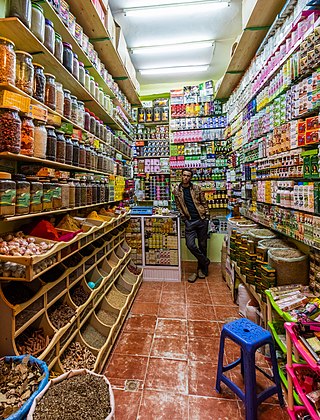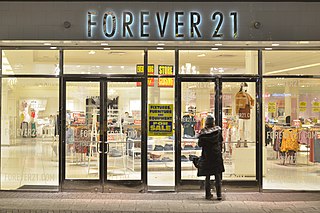
Retail is the sale of goods and services to consumers, in contrast to wholesaling, which is sale to business or institutional customers. A retailer purchases goods in large quantities from manufacturers, directly or through a wholesaler, and then sells in smaller quantities to consumers for a profit. Retailers are the final link in the supply chain from producers to consumers.
A grey market or dark market is the trade of a commodity through distribution channels that are not authorized by the original manufacturer or trade mark proprietor. Grey market products are products traded outside the authorized manufacturer's channel.

The list price, also known as the manufacturer's suggested retail price (MSRP), or the recommended retail price (RRP), or the suggested retail price (SRP) of a product is the price at which its manufacturer notionally recommends that a retailer sell the product.
An ad valorem tax is a tax whose amount is based on the value of a transaction or of a property. It is typically imposed at the time of a transaction, as in the case of a sales tax or value-added tax (VAT). An ad valorem tax may also be imposed annually, as in the case of a real or personal property tax, or in connection with another significant event. In some countries, a stamp duty is imposed as an ad valorem tax.

Border trade, in general, refers to the flow of goods and services across the border between different jurisdictions. In this sense, border trade is a part of the normal trade that flows through the ordinary export/import legal and logistical frameworks of nations and smaller jurisdictions. However border trade specifically refers to the increase in trade in areas where crossing borders is relatively easy and where products are significantly less expensive on one side of the border than the other – often because of significant variations in taxation levels on goods. Common items involved in border trade include alcohol, tobacco, medication, recreational drugs, automobiles, automotive fuel, groceries, furniture and clothing.
A parallel import is a non-counterfeit product imported from another country without the permission of the intellectual property owner. Parallel imports are often referred to as grey product and are implicated in issues of international trade, and intellectual property.

A duty-free shop is a retail outlet whose goods are exempt from the payment of certain local or national taxes and duties, on the requirement that the goods sold will be sold to travelers who will take them out of the country, who will then pay duties and taxes in their destination country. Which products can be sold duty-free vary by jurisdiction, as well as how they can be sold, and the process of calculating the duty or refunding the duty component.
VAT-free imports from the Channel Islands to the United Kingdom took place for a few years during the early 21st century as a result of low-value consignment relief (LVCR). This is a tax relief that applies to low-valued imports to the European Union, exempting them from value-added tax (VAT). Although the UK was a part of the EU from 1973 until Brexit in 2020, the Channel Islands were not and, unlike the UK, they did not charge VAT on purchases. The UK government applied LVCR to imports from the Channel Islands, resulting in the construction of distribution centres on the islands and the export of many low-valued goods from there to the UK. The practice was unilaterally brought to an end in April 2012 by HM Treasury, the finance department of the UK government.
Tax-free shopping (TFS) is the buying of goods in another country or state and obtaining a refund of the sales tax which has been collected by the retailer on those goods. The sales tax may be variously described as a sales tax, goods and services tax (GST), value added tax (VAT), or consumption tax.

A closeout or clearance sale is a discount sale of inventory either by retail or wholesale. It may be that a product is not selling well, or that the retailer is closing because of relocation, a fire, over-ordering, or especially because of bankruptcy. In the latter case, it is usually known as a going-out-of-business sale or liquidation sale, and is part of the process of liquidation. A hail sale is a closeout at a car dealership after hail damage.

An import is the receiving country in an export from the sending country. Importation and exportation are the defining financial transactions of international trade.
Fulfillment house and fulfillment center are modern terms for a packing warehouse. The terms were coined in the middle of the 1990s, and "fulfillment center" is usually used about an in-house packing warehouse, while "fulfillment house" tends to be used about companies that specialize in warehousing and packing for others.

The European Union value-added tax is a value added tax on goods and services within the European Union (EU). The EU's institutions do not collect the tax, but EU member states are each required to adopt in national legislation a value added tax that complies with the EU VAT code. Different rates of VAT apply in different EU member states, ranging from 17% in Luxembourg to 27% in Hungary. The total VAT collected by member states is used as part of the calculation to determine what each state contributes to the EU's budget.
Free shipping is a marketing tactic used primarily by online vendors and mail-order catalogs as a sales strategy to attract customers.
When goods are imported into a European Union country from a non-EU territory, those goods may be subject to customs duty, excise duty and value-added tax.

In the United Kingdom, the value added tax (VAT) was introduced in 1973, replacing Purchase Tax, and is the third-largest source of government revenue, after income tax and National Insurance. It is administered and collected by HM Revenue and Customs, primarily through the Value Added Tax Act 1994.

Omnichannel retail strategy, originally also known in the U.K. as bricks and clicks, is a business model by which a company integrates both offline (bricks) and online (clicks) presences, sometimes with the third extra flips.
The Consumer Rights Directive 2011/83/EU is a consumer protection measure in EU law. It was due to be implemented by 13 December 2013
FTC v. Balls of Kryptonite is an enforcement action brought in 2009 by the U.S. Federal Trade Commission (FTC) in United States District Court for the Central District of California. The defendant was Jaivin Karnani, a Southern California man, his company Balls of Kryptonite LLC, and several other corporate names they did business as. In 2011 the FTC secured a court order barring Karnani and Balls of Kryptonite from engaging in many of the deceptive business practices that had brought him to the agency's attention.

A value-added tax (VAT), known in some countries as a goods and services tax (GST), is a type of tax that is assessed incrementally. It is levied on the price of a product or service at each stage of production, distribution, or sale to the end consumer. If the ultimate consumer is a business that collects and pays to the government VAT on its products or services, it can reclaim the tax paid. It is similar to, and is often compared with, a sales tax. VAT is an indirect tax because the person who ultimately bears the burden of the tax is not necessarily the same person as the one who pays the tax to the tax authorities.









